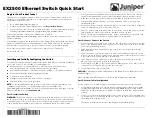
DCB, Inc.
2949 CR 1000 E
Dewey, Illinois
61840
217.897.6600 Tel
800.432.2638 Toll Free
217.897.1331 Fax
www.dcbnet.com
Asynchronous Data Over Synchronous Links Using Oversampling
Any synchronous bit stream RS232 interface can transport asynchronous data that is 1/3 or less
the synchronous data rate. For example, 2400 async data can be sent over a 9600 bps
synchronous link. Data running async 9600 can be sent over a synchronous 56 or 64 kbps link.
Data at 19200 bps is right at the borderline with 56 kbps links, but will typically work reliably.
Likewise, 38,400 bps async data can be sent over a synchronous link of 192 kbps or 256 kbs.
While 1/3 may be sufficient, it is preferable to have a synchronous sample rate that is at least 4
times faster than the asynchronous data rate.
The key is that the synchronous channel is fast enough so the bit width of the async data is the
1/3 or less the sync bit width. The async bit width can be distorted and shift back and forth (jitter)
as long as the sync sampling is fast enough.
Async UARTS will sample async data at a rate 16 times the async bits per second rate. A UART
sets or resets its sampling starting point whenever there is a data transition between a one to a
zero (mark to space). The async UART then counts over 8 sample times to the middle of the
data bit transition data, where each count, or sample, is 1/16th of the async bit time. At the 8
th
sample, the UART makes the decision if the bit is a one or is a zero.
With asynchronous characters, typically 8 data bits plus a start bit and a stop bit, the UART is
guaranteed that there is a zero at least every 10 bits, since every start bit of a character is a
start/space/zero bit that follows a stop/mark/one bit.
How over sampling works is illustrated below with underscore and dash, where the underscore
represents a one, the dash a zero. The sync sample is a “+” , the async sample is “|”:
Async Bit: ___----------------____
Sync sample Rate: + + + + + +
Async UART sample Rate:|||||||||||||||||||||||||||||
The above shows that both the sync data channel and the async UART use sampling. The sync
channel sampling of the async data mimics the function of the standard async UART, but with a
lower sample rate. While the sample rate is lower, the async one and zero data bits are sampled
fast enough to allow the sync channel to replicate the data over the communications link.
Page 17

































